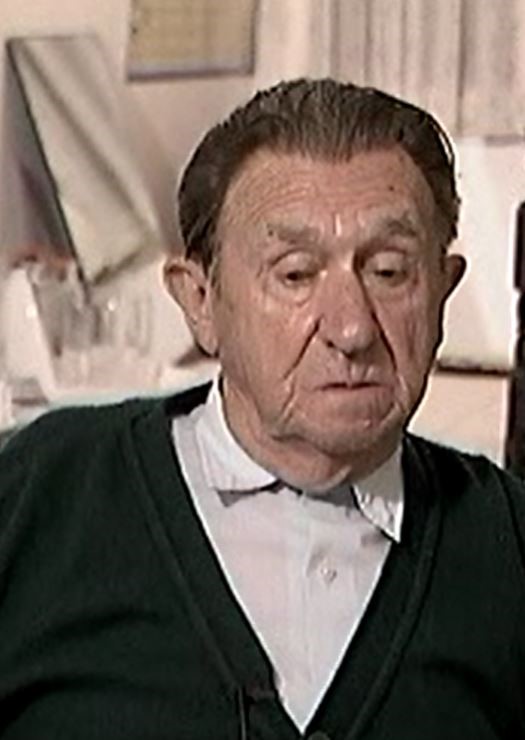Meyer Barenbaum was born in 1922 in the village of Selezni, near Velizh in western Russia, as the second of three children. The family's permanent place of residence was the town of Velizh. Meyer's father Moisei (Moses), a veteran of World War I, was the manager of a sawmill, and he eventually became the head of a timber rafting company. His mother Frida was a homemaker. Meyer received a basic traditional Jewish education from his grandfather, who was a melamed [religious teacher]. In 1930, he entered a Yiddish school in Velizh, which he finished in 1937.
In June 1941, the Soviet-German War broke out. In mid-July that year, Velizh was occupied by the Germans. The Barenbaum family, along with the rest of the town's Jews, were moved into a ghetto. In the Velizh Ghetto, Meyer witnessed German atrocities: random beatings and killings of Jews, rapes of Jewish girls, etc. In September, Meyer and his brother escaped from the ghetto and hid in Tishchenki, a village sixty kilometers from Velizh, which had been one of his father's workplaces before the war, and where Meyer had some acquaintances. A week later, the brothers were denounced to the collaborationist police. They were arrested and taken to the ghetto in the nearby town of Ilyino. This fact was to save Meyer's life, because the planned mass murder of the Jews of Ilyino was thwarted by a sudden raid of the Soviet 4th Shock Army on January 24, 1942, which liberated the townlet.
On February 15, 1942, Meyer was drafted into the Red Army and attached to the 147th Reserve Regiment of the same 4th Shock Army that had liberated Ilyino. He was sent to a school for subaltern commanders. The 4th Shock Army was attached to the Kalinin Front (later renamed the 1st Baltic Front), and Barenbaum spent his period of active military service, from May 1942 to December 1943, in the area of Velizh and in the Vitebsk Region of Belorussia. On May 2, 1942, the mortar gunner Sergeant Meyer Barenbaum arrived on the front lines, in the vicinity of his native town of Velizh, which was still held by the Germans. Barenbaum would later recall that he was enthusiastic about his mobilization, regarding it as an opportunity to take revenge on the Germans for all he had witnessed in the Velizh Ghetto.
On one of the first days of his frontline service, Meyer accompanied a caravan of horse-drawn carts sent to the villages to gather provisions for the army. He was surprised to see that one of the horse drivers was the former collaborationist mayor of Ilyino – whose name, according to Barenbaum's 1997 interview, was Poludurakov.
"I said to the senior lieutenant, who was in the same house as me… 'Our buergermeister is standing over there'. We quickly approached him. 'Who are you?' He says: 'I am a coachman.' I say: 'If you are a coachman, who is Poludurakov?' He lost his nerve. There was a soldier with us, and we did a full-body search on him [Poludurakov] and found a German pistol with two spare cartridge clips, along with a pack of German tobacco. We took him away some 150 meters, and the officer ordered the soldier to shoot him.… And that was how we killed Poludurakov."1
On May 6, 1942, Meyer was wounded. After being discharged from the hospital, he was reattached to the 147th Reserve Regiment.
Barenbaum states that he never experienced antisemitism in the Red Army. Nevertheless, in his regiment he registered himself as 'Dmitrii Barenbaum' 2: the first name Meyer might have displeased his Russian comrades.
In December 1943, during the liberation of the town of Haradok in the Vitebsk Region, Meyer was seriously wounded. After a long stay in hospitals, he was discharged from the military. In the course of the war, Barenbaum was awarded the Order of Glory, 3rd class, and some medals.
In 1947, Barenbaum graduated from the Minsk School of Law, and he went on to serve as an investigator. Paradoxically, two weeks after receiving a letter of gratitude from the Attorney-in-Chief of the Belorussian SSR on May 1, 1952, he was fired from his post, because of the ongoing Stalinist anti-Jewish campaign. Barenbaum then moved to Kazakhstan, where he worked for the next forty-two years as a legal advisor at various industrial enterprises.
In 1994, having been diagnosed with cancer, Meyer Barenbaum immigrated to Israel. He lived in Jerusalem.







